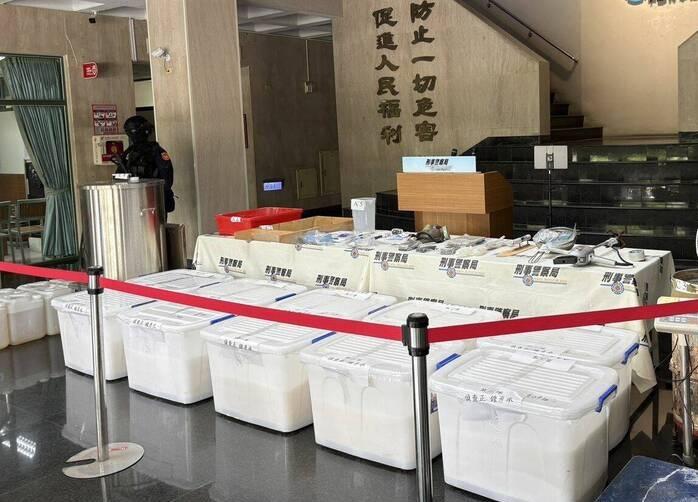Taichung prosecutors today said they have indicted five suspects on charges of manufacturing narcotics, after 1,756kg of ketamine was seized with a street value of NT$1.5 billion (US$48.84 million) from a factory in Changhua County.
The Criminal Investigation Bureau said it received intelligence in June that a drug-smuggling ring was producing ketamine in a 1,650m² corrugated iron factory in an industrial park of Changhua County’s Siansi Township (線西), hoping that nearby plastic and machinery factories would mask the smell.
Ketamine is a Category 3 narcotic in Taiwan.

Photo: Chen Chien-chih, Taipei Times
The Taichung District Prosecutors’ Office instructed the bureau and the Taichung Police Department to gather evidence and obtained a search warrant on June 19, after which it dispatched a special task force to raid the site.
Police seized 628kg of ketamine and 1,228kg of unfinished product, plus plastic and metal drums, raw chemical materials, drug-making equipment and mobile phones, the office said.
Five suspects were arrested, including the suspected ringleader, a man surnamed Chen (陳).
They were transferred to the Taichung District Prosecutors’ Office for investigation before a court approved their detention.
Authorities said they are continuing to trace the distribution channels of the seized drugs, which have been destroyed according to regulations.

A drunk woman was sexually assaulted inside a crowded concourse of Taipei Railway Station on Thursday last week before a foreign tourist notified police, leading to calls for better education on bystander intervention and review of security infrastructure. The man, surnamed Chiu (邱), was taken into custody on charges of sexual assault, taking advantage of the woman’s condition and public indecency. Police discovered that Chiu was a fugitive with prior convictions for vehicle theft. He has been taken into custody and is to complete his unserved six-month sentence, police said. On Thursday last week, Chiu was seen wearing a white

EVA Airways, one of the leading international carriers in Taiwan, yesterday said that it was investigating reports that a cabin crew manager had ignored the condition of a sick flight attendant, who died on Saturday. The airline made the statement in response to a post circulating on social media that said that the flight attendant on an outbound flight was feeling sick and notified the cabin crew manager. Although the flight attendant grew increasingly ill on the return flight, the manager did not contact Medlink — a system that connects the aircraft to doctors on the ground for treatment advice during medical

The Taoyuan Flight Attendants’ Union yesterday vowed to protest at the EVA Air Marathon on Sunday next week should EVA Airway Corp’s management continue to ignore the union’s petition to change rules on employees’ leave of absence system, after a flight attendant reportedly died after working on a long-haul flight while ill. The case has generated public discussion over whether taking personal or sick leave should affect a worker’s performance review. Several union members yesterday protested at the Legislative Yuan, holding white flowers and placards, while shouting: “Life is priceless; requesting leave is not a crime.” “The union is scheduled to meet with

‘UNITED FRONT’ RHETORIC: China’s TAO also plans to hold weekly, instead of biweekly, news conferences because it wants to control the cross-strait discourse, an expert said China’s plan to expand its single-entry visa-on-arrival service to Taiwanese would be of limited interest to Taiwanese and is a feeble attempt by Chinese administrators to demonstrate that they are doing something, the Mainland Affairs Council said yesterday. China’s Taiwan Affairs Office (TAO) spokesman Chen Binhua (陳斌華) said the program aims to facilitate travel to China for Taiwanese compatriots, regardless of whether they are arriving via direct flights or are entering mainland China through Hong Kong, Macau or other countries, and they would be able to apply for a single-entry visa-on-arrival at all eligible entry points in China. The policy aims